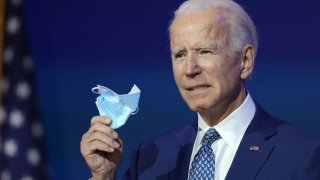
The United States currently faces record-high levels of more than 100,000 cases of Covid-19 a day. President-elect Joe Biden has a plan to tackle the pandemic when he takes office on Jan. 20.
On Monday, Biden announced a new coronavirus task force that consists of 13 physicians, public health experts and researchers, and outlined via a seven-point plan how his administration will address the pandemic. (He also laid out plans for economic recovery, racial justice and climate change.)
So, how will Biden's plan change daily life during the pandemic? Here's what you need to know:
More mask mandates
While there has been no national mandate that says people must wear face masks outside of the home, Biden plans to "implement mask mandates nationwide by working with governors and mayors," according to the Biden-Harris official transition website. Biden plans to personally call governors and mayors of major cities to encourage mask mandates, NBC News reported Sunday.
Mask mandates can have a "profound effect" on limiting the spread of Covid-19, and it's been proven in states with them in place already, Dr. Rajesh Gandhi, an infectious diseases physician at Massachusetts General Hospital and Harvard Medical School, and chair of the HIV Medicine Association, tells CNBC Make It. Although 34 states have statewide mask mandates, some leave it up to local municipalities to set guidelines. For example, in Florida, Missouri, Arizona and Iowa do not have statewide mask mandates.
On the campaign trail, Biden said he supported national mask mandates in all federal buildings and all interstate transportation (which doesn't currently exist), something that could be achieved through an executive order.
Money Report
Experts say that, from a legal perspective, it's unclear whether the president would even have the authority to issue a national mask mandate in the U.S. "Depending on the scope of a direct federal mask mandate, there may not be an existing federal mechanism suitable to enforce it," according to the Congressional Research Service.
Still, Biden's support of masks could be impactful: "It's not so much about the enforcement of the mandate, it's just leading by example," Gandhi says.
"Please, I implore you, wear a mask," Biden said in a press conference Monday after meeting with his coronavirus advisory board. "Do it for yourself. Do it for your neighbor. A mask is not a political statement, but it is a good way to start pulling the country together."
Quicker Covid-19 testing
The Biden-Harris Covid-19 plan is to "ensure all Americans have access to regular, reliable and free testing" for Covid-19. That means increasing the number of drive-through Covid-19 testing sites by twofold and investing in technology for at-home and instant tests, according to the transition website.
"It's important that we have, not just people who are sick are getting tested, but we're testing all the time we know where the the virus is breaking through," Sherry Glied, dean of the NYU Wagner Graduate School of Public Service tells CNBC Make It.
Most Covid-19 tests so far have been PCR-based (meaning they look for the virus's genetic material), which are not as rapid as antigen tests (which look for specific proteins from the virus), Gandhi says. "Technology has advanced, and there are rapid test tests to give an answer within 15 or 20 minutes," he says.
These rapid tests are currently used in "congregate settings," such as nursing homes and facilities, but he says they will get to the point where they're used more broadly. (The Food and Drug Administration has authorized , called Pixel, which takes 24 to 48 hours for results. Abbott's antigen test, BinaxNOW COVID-19 Ag Card, is a $5 test that only takes 15 minutes.)
To scale up test production and distribute them to tens of millions of people, Biden would create a "Pandemic Testing Board like Roosevelt's War Production Board," according to the transition website. During World War II, President Franklin D. Roosevelt created an agency to help produce supplies and weapons.
Biden also plans to create a U.S. Public Health Jobs Corps of at least 100,000 contact tracers around the country, specifically in areas with under-resourced public health departments. Contact tracing is an important measure that helps control transmission and prevent spikes in cases.
The numbers currently suggest that most states do not have enough contact tracers to handle the population. The American Medical Association said in July that 100,000 contact tracers would be necessary to control transmission. A joint survey from NPR and the Johns Hopkins Center for Health Security found that there are only 41,122 contact tracers in the U.S. as of August.
As for treatment and vaccines, Biden's plan proposes investing $25 billion to go toward vaccine manufacturing and distribution, so that everyone "not just the wealthy and well-connected" have access. The president-elect said the news about the Pfizer vaccine candidate on Monday was, "cause for hope," in a statement. But he added that even if the vaccine timeline goes as planned, "it will be many more months before there is widespread vaccination in this country."
Paid sick leave
Biden proposes emergency paid leave for anyone who gets Covid-19 (regardless of whether these individuals are gig-workers or work part-time), as well as those who are taking care of family members or other loved with the virus, according to his campaign website.
"There is actually some evidence to suggest that paid sick leave reduces the spread of infectious diseases," Glied says.
(He is also for increasing access to general sick leave, and "will sign legislation for universal paid sick days and 12 weeks of paid family and medical leave," according to the transition website.)
Social distancing: 'Not a light switch. It is a dial.'
Biden's plan makes clear that the Centers for Disease Control will provide specific, evidence-based guidance for communities about navigating the pandemic. "The problems we've had so far is that the CDC has really not been a consistent source of that kind of information," Glied says.
If people have access to information about the spread in their community, "they'll be able to take precautions more effectively for themselves and also anticipate what was going to happen in their community," Glied says.
As the Biden-Harris transition website says: "Social distancing is not a light switch. It is a dial." According to the proposed plan, Biden will direct the Centers for Disease Control's decision to turn the dial "up" or "down" (that is, increase restrictions or loosen up), based on research on the relative risk and the degree of spread in a community.
This includes determining when to open or close schools, and figuring out what resources and procedures are needed to make classrooms safe. Biden's plan also involves passing an emergency package through Congress that would ensure schools can pay for these resources, as well as a renewable fund for state and local governments to prevent budget cuts from hitting teachers and first responders.
Check out: Here’s what President-elect Joe Biden wants to include in a coronavirus stimulus bill
Don't miss: Best credit cards for Black Friday and Cyber Monday shopping of 2020






